Law for Business Managers: Forms of Business, Elements of Contract, and Directors' Duties
VerifiedAdded on 2023/06/14
|12
|3657
|299
AI Summary
This guide covers the different forms of business, including sole proprietorship, partnership, limited liability partnership, and limited company. It also discusses the essential elements of a valid contract, such as offer, acceptance, consideration, legal intention, and invitation to offer. Additionally, it explains the duties of directors as per the Companies Act of 2006, including the duty to uplift the performance of the company, act within the prescribed authority and powers, possess certain skills and due diligence, exercise independent judgement, and avoid conflicts within the enterprise.
Contribute Materials
Your contribution can guide someone’s learning journey. Share your
documents today.
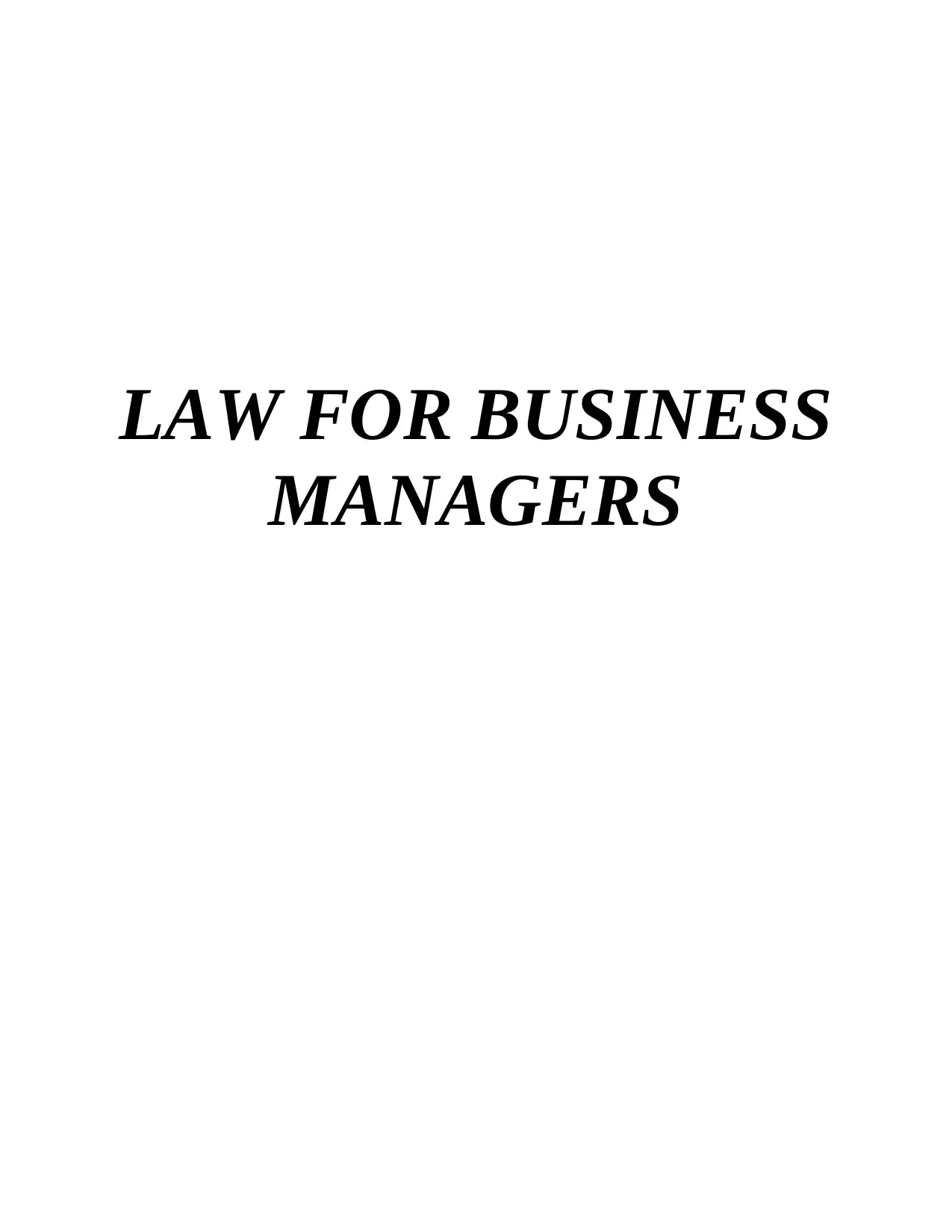
LAW FOR BUSINESS
MANAGERS
MANAGERS
Secure Best Marks with AI Grader
Need help grading? Try our AI Grader for instant feedback on your assignments.
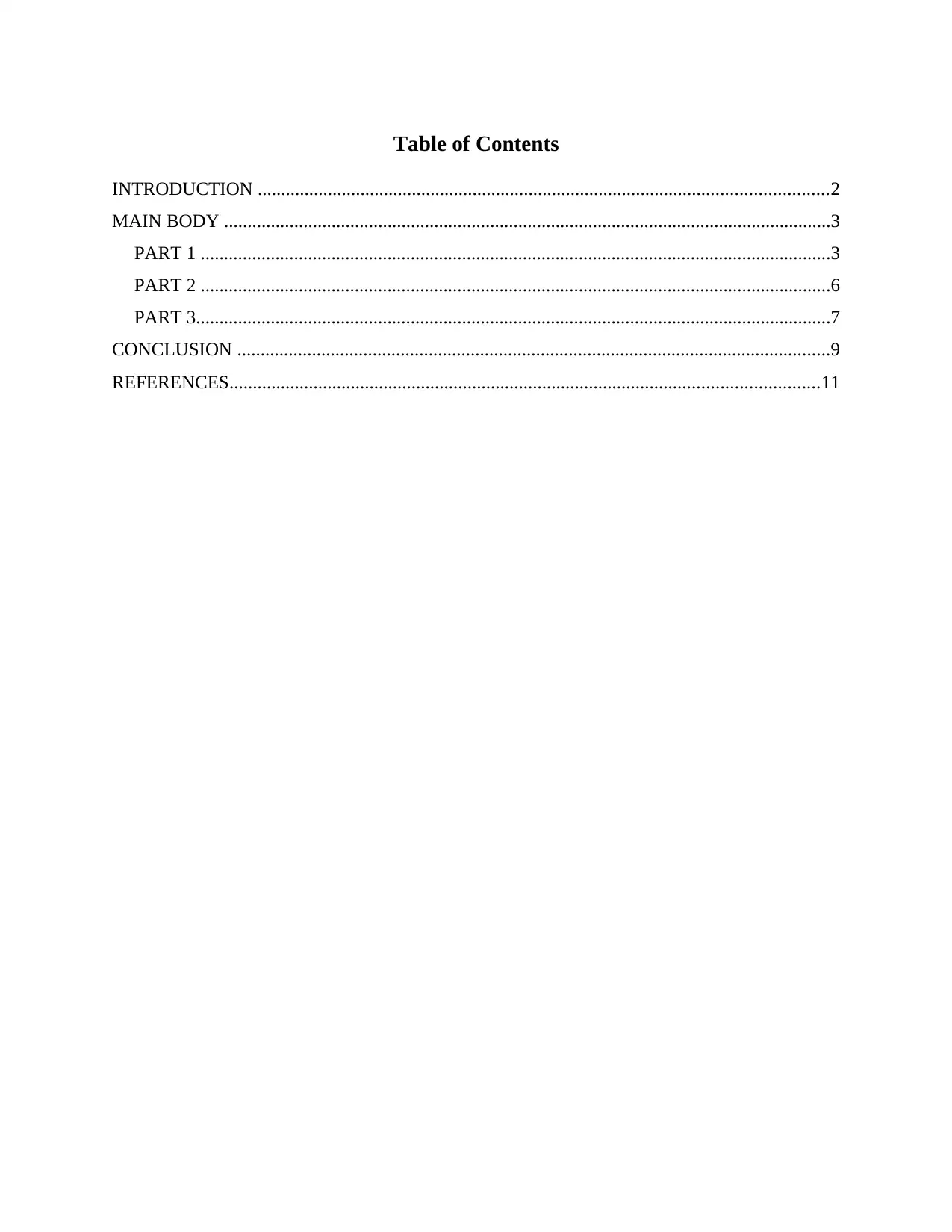
Table of Contents
INTRODUCTION ..........................................................................................................................2
MAIN BODY ..................................................................................................................................3
PART 1 .......................................................................................................................................3
PART 2 .......................................................................................................................................6
PART 3........................................................................................................................................7
CONCLUSION ...............................................................................................................................9
REFERENCES..............................................................................................................................11
INTRODUCTION ..........................................................................................................................2
MAIN BODY ..................................................................................................................................3
PART 1 .......................................................................................................................................3
PART 2 .......................................................................................................................................6
PART 3........................................................................................................................................7
CONCLUSION ...............................................................................................................................9
REFERENCES..............................................................................................................................11
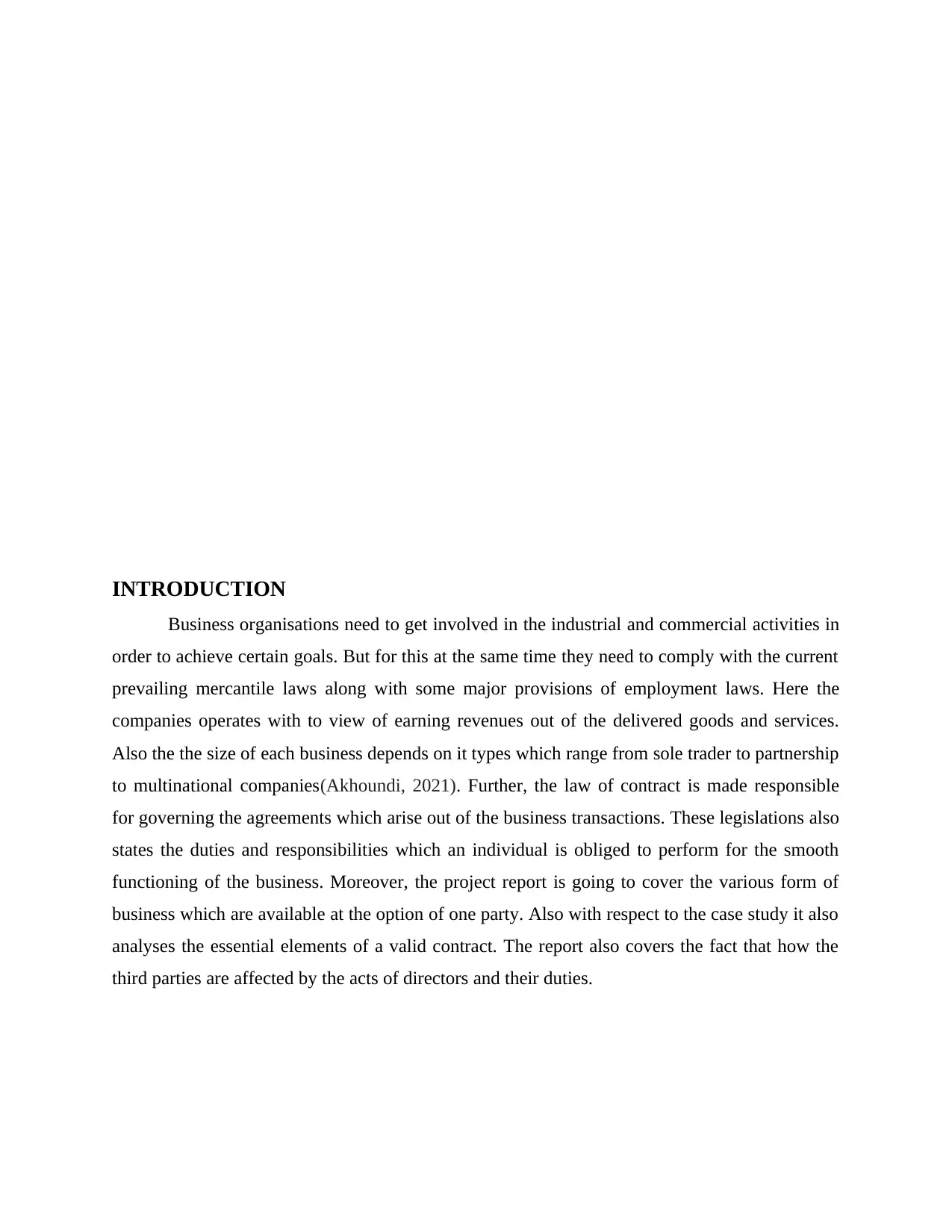
INTRODUCTION
Business organisations need to get involved in the industrial and commercial activities in
order to achieve certain goals. But for this at the same time they need to comply with the current
prevailing mercantile laws along with some major provisions of employment laws. Here the
companies operates with to view of earning revenues out of the delivered goods and services.
Also the the size of each business depends on it types which range from sole trader to partnership
to multinational companies(Akhoundi, 2021). Further, the law of contract is made responsible
for governing the agreements which arise out of the business transactions. These legislations also
states the duties and responsibilities which an individual is obliged to perform for the smooth
functioning of the business. Moreover, the project report is going to cover the various form of
business which are available at the option of one party. Also with respect to the case study it also
analyses the essential elements of a valid contract. The report also covers the fact that how the
third parties are affected by the acts of directors and their duties.
Business organisations need to get involved in the industrial and commercial activities in
order to achieve certain goals. But for this at the same time they need to comply with the current
prevailing mercantile laws along with some major provisions of employment laws. Here the
companies operates with to view of earning revenues out of the delivered goods and services.
Also the the size of each business depends on it types which range from sole trader to partnership
to multinational companies(Akhoundi, 2021). Further, the law of contract is made responsible
for governing the agreements which arise out of the business transactions. These legislations also
states the duties and responsibilities which an individual is obliged to perform for the smooth
functioning of the business. Moreover, the project report is going to cover the various form of
business which are available at the option of one party. Also with respect to the case study it also
analyses the essential elements of a valid contract. The report also covers the fact that how the
third parties are affected by the acts of directors and their duties.
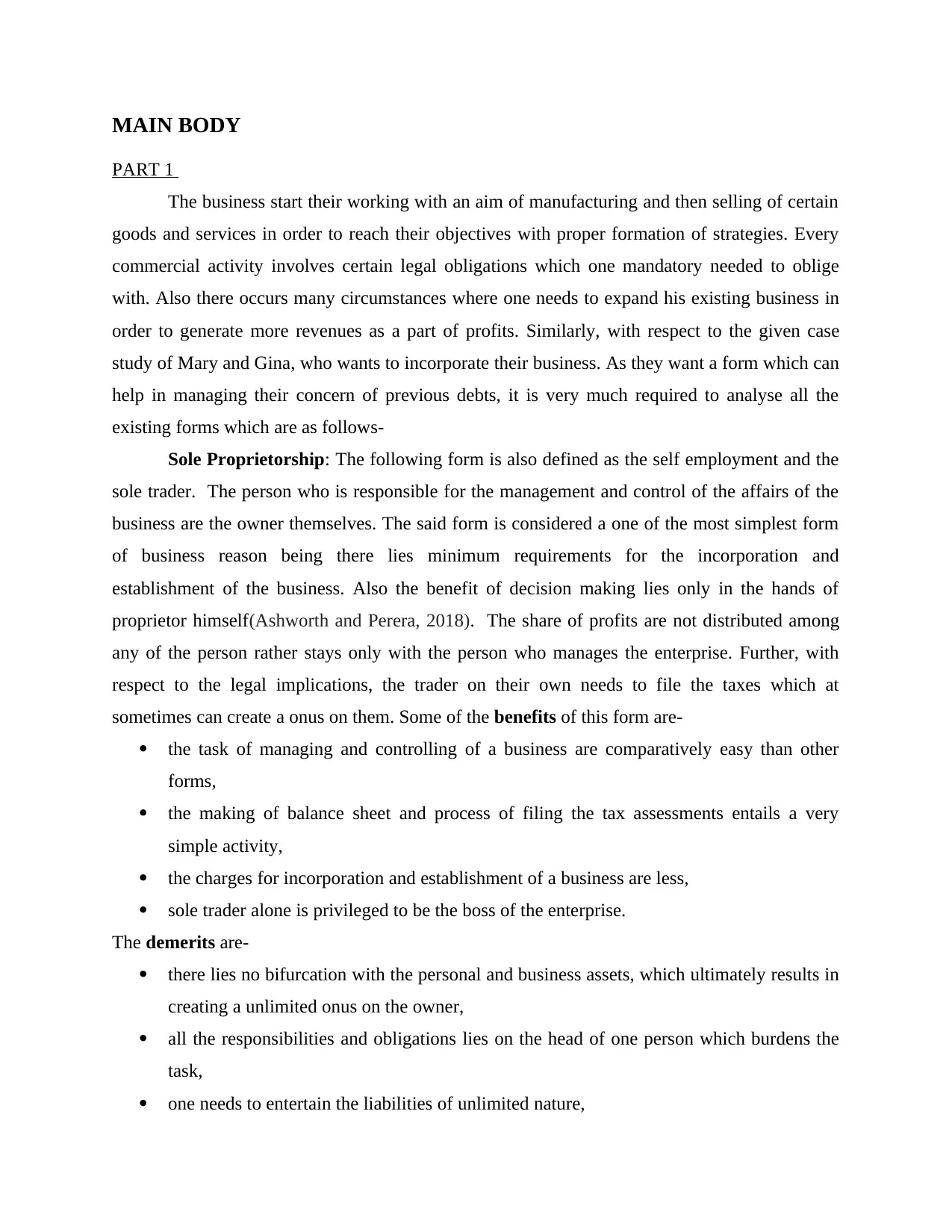
MAIN BODY
PART 1
The business start their working with an aim of manufacturing and then selling of certain
goods and services in order to reach their objectives with proper formation of strategies. Every
commercial activity involves certain legal obligations which one mandatory needed to oblige
with. Also there occurs many circumstances where one needs to expand his existing business in
order to generate more revenues as a part of profits. Similarly, with respect to the given case
study of Mary and Gina, who wants to incorporate their business. As they want a form which can
help in managing their concern of previous debts, it is very much required to analyse all the
existing forms which are as follows-
Sole Proprietorship: The following form is also defined as the self employment and the
sole trader. The person who is responsible for the management and control of the affairs of the
business are the owner themselves. The said form is considered a one of the most simplest form
of business reason being there lies minimum requirements for the incorporation and
establishment of the business. Also the benefit of decision making lies only in the hands of
proprietor himself(Ashworth and Perera, 2018). The share of profits are not distributed among
any of the person rather stays only with the person who manages the enterprise. Further, with
respect to the legal implications, the trader on their own needs to file the taxes which at
sometimes can create a onus on them. Some of the benefits of this form are-
the task of managing and controlling of a business are comparatively easy than other
forms,
the making of balance sheet and process of filing the tax assessments entails a very
simple activity,
the charges for incorporation and establishment of a business are less,
sole trader alone is privileged to be the boss of the enterprise.
The demerits are-
there lies no bifurcation with the personal and business assets, which ultimately results in
creating a unlimited onus on the owner,
all the responsibilities and obligations lies on the head of one person which burdens the
task,
one needs to entertain the liabilities of unlimited nature,
PART 1
The business start their working with an aim of manufacturing and then selling of certain
goods and services in order to reach their objectives with proper formation of strategies. Every
commercial activity involves certain legal obligations which one mandatory needed to oblige
with. Also there occurs many circumstances where one needs to expand his existing business in
order to generate more revenues as a part of profits. Similarly, with respect to the given case
study of Mary and Gina, who wants to incorporate their business. As they want a form which can
help in managing their concern of previous debts, it is very much required to analyse all the
existing forms which are as follows-
Sole Proprietorship: The following form is also defined as the self employment and the
sole trader. The person who is responsible for the management and control of the affairs of the
business are the owner themselves. The said form is considered a one of the most simplest form
of business reason being there lies minimum requirements for the incorporation and
establishment of the business. Also the benefit of decision making lies only in the hands of
proprietor himself(Ashworth and Perera, 2018). The share of profits are not distributed among
any of the person rather stays only with the person who manages the enterprise. Further, with
respect to the legal implications, the trader on their own needs to file the taxes which at
sometimes can create a onus on them. Some of the benefits of this form are-
the task of managing and controlling of a business are comparatively easy than other
forms,
the making of balance sheet and process of filing the tax assessments entails a very
simple activity,
the charges for incorporation and establishment of a business are less,
sole trader alone is privileged to be the boss of the enterprise.
The demerits are-
there lies no bifurcation with the personal and business assets, which ultimately results in
creating a unlimited onus on the owner,
all the responsibilities and obligations lies on the head of one person which burdens the
task,
one needs to entertain the liabilities of unlimited nature,
Secure Best Marks with AI Grader
Need help grading? Try our AI Grader for instant feedback on your assignments.
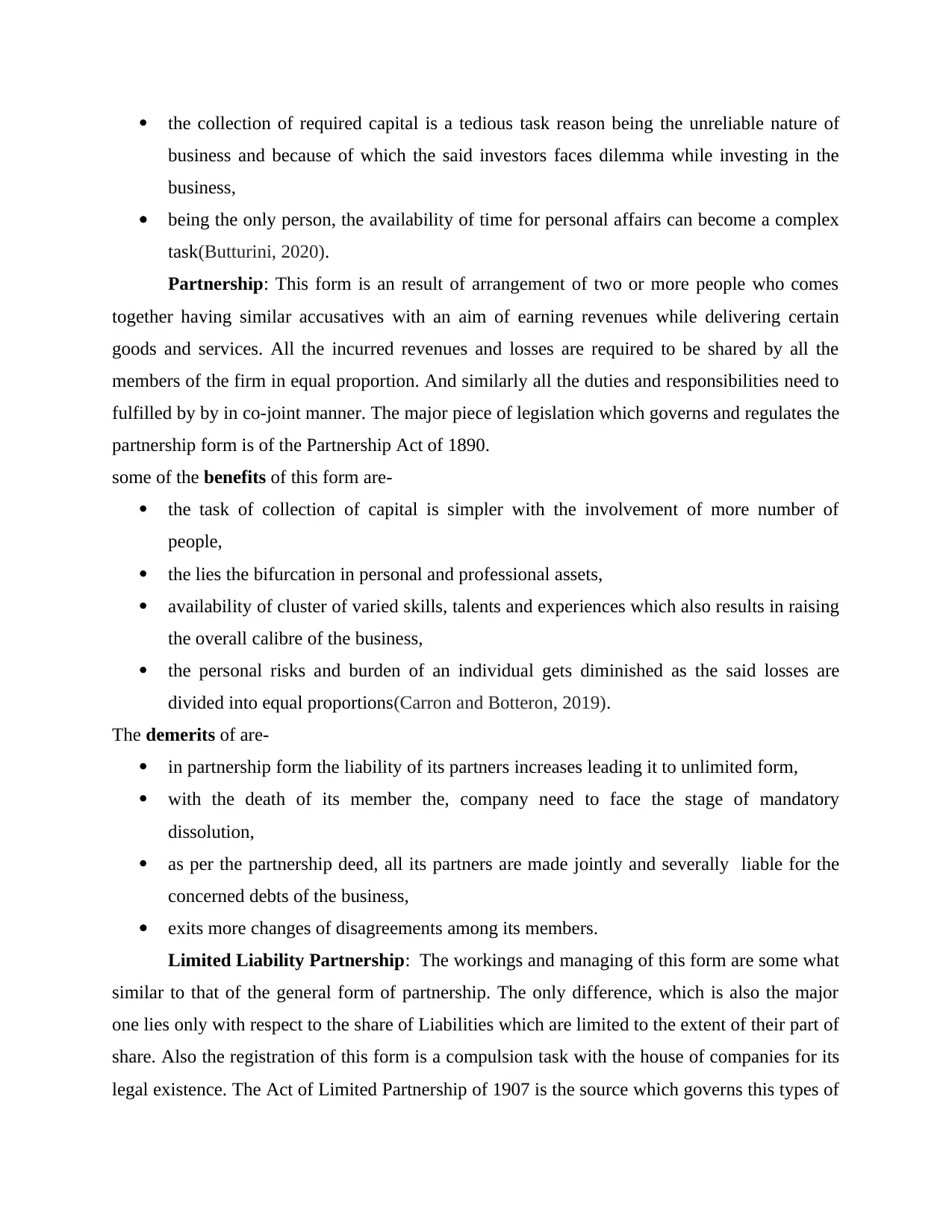
the collection of required capital is a tedious task reason being the unreliable nature of
business and because of which the said investors faces dilemma while investing in the
business,
being the only person, the availability of time for personal affairs can become a complex
task(Butturini, 2020).
Partnership: This form is an result of arrangement of two or more people who comes
together having similar accusatives with an aim of earning revenues while delivering certain
goods and services. All the incurred revenues and losses are required to be shared by all the
members of the firm in equal proportion. And similarly all the duties and responsibilities need to
fulfilled by by in co-joint manner. The major piece of legislation which governs and regulates the
partnership form is of the Partnership Act of 1890.
some of the benefits of this form are-
the task of collection of capital is simpler with the involvement of more number of
people,
the lies the bifurcation in personal and professional assets,
availability of cluster of varied skills, talents and experiences which also results in raising
the overall calibre of the business,
the personal risks and burden of an individual gets diminished as the said losses are
divided into equal proportions(Carron and Botteron, 2019).
The demerits of are-
in partnership form the liability of its partners increases leading it to unlimited form,
with the death of its member the, company need to face the stage of mandatory
dissolution,
as per the partnership deed, all its partners are made jointly and severally liable for the
concerned debts of the business,
exits more changes of disagreements among its members.
Limited Liability Partnership: The workings and managing of this form are some what
similar to that of the general form of partnership. The only difference, which is also the major
one lies only with respect to the share of Liabilities which are limited to the extent of their part of
share. Also the registration of this form is a compulsion task with the house of companies for its
legal existence. The Act of Limited Partnership of 1907 is the source which governs this types of
business and because of which the said investors faces dilemma while investing in the
business,
being the only person, the availability of time for personal affairs can become a complex
task(Butturini, 2020).
Partnership: This form is an result of arrangement of two or more people who comes
together having similar accusatives with an aim of earning revenues while delivering certain
goods and services. All the incurred revenues and losses are required to be shared by all the
members of the firm in equal proportion. And similarly all the duties and responsibilities need to
fulfilled by by in co-joint manner. The major piece of legislation which governs and regulates the
partnership form is of the Partnership Act of 1890.
some of the benefits of this form are-
the task of collection of capital is simpler with the involvement of more number of
people,
the lies the bifurcation in personal and professional assets,
availability of cluster of varied skills, talents and experiences which also results in raising
the overall calibre of the business,
the personal risks and burden of an individual gets diminished as the said losses are
divided into equal proportions(Carron and Botteron, 2019).
The demerits of are-
in partnership form the liability of its partners increases leading it to unlimited form,
with the death of its member the, company need to face the stage of mandatory
dissolution,
as per the partnership deed, all its partners are made jointly and severally liable for the
concerned debts of the business,
exits more changes of disagreements among its members.
Limited Liability Partnership: The workings and managing of this form are some what
similar to that of the general form of partnership. The only difference, which is also the major
one lies only with respect to the share of Liabilities which are limited to the extent of their part of
share. Also the registration of this form is a compulsion task with the house of companies for its
legal existence. The Act of Limited Partnership of 1907 is the source which governs this types of
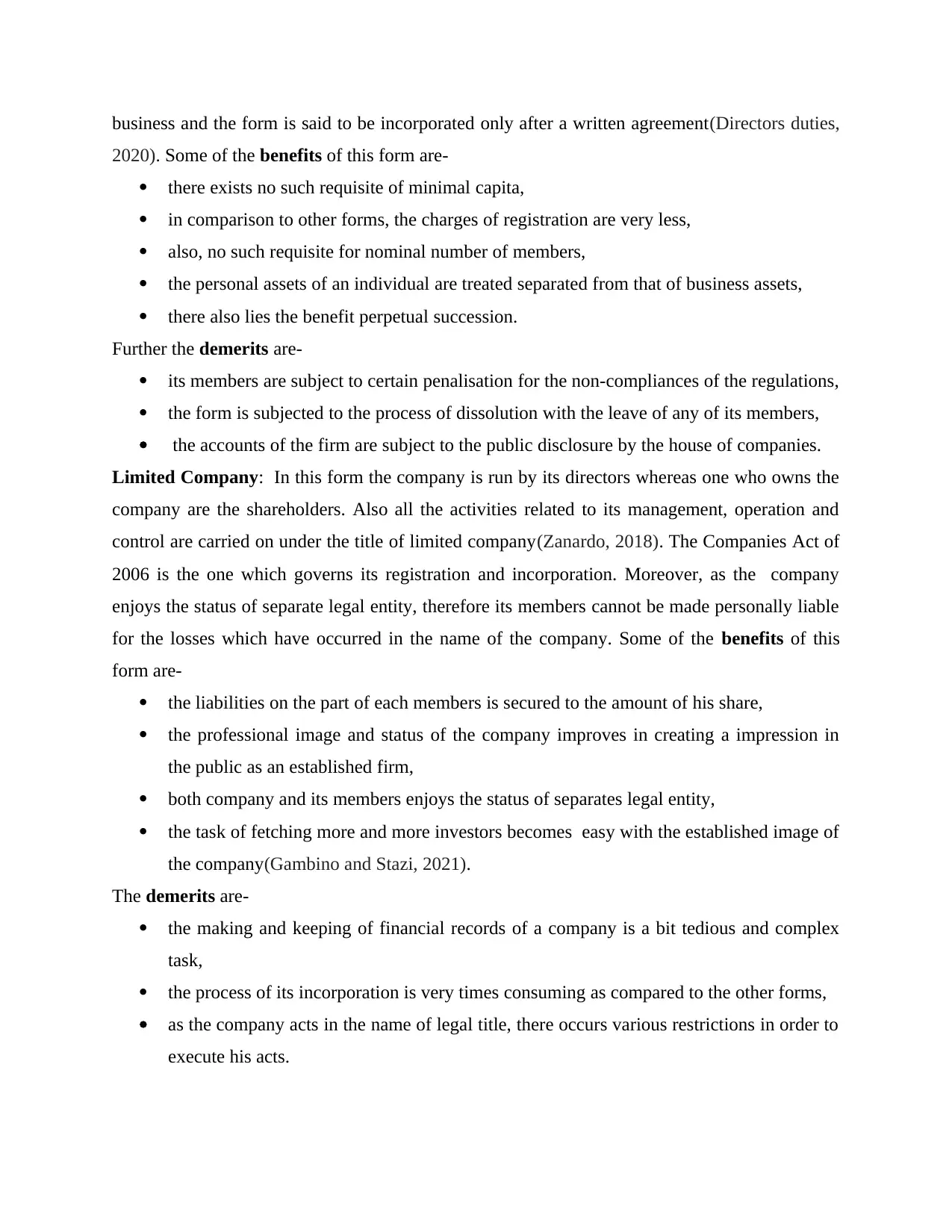
business and the form is said to be incorporated only after a written agreement(Directors duties,
2020). Some of the benefits of this form are-
there exists no such requisite of minimal capita,
in comparison to other forms, the charges of registration are very less,
also, no such requisite for nominal number of members,
the personal assets of an individual are treated separated from that of business assets,
there also lies the benefit perpetual succession.
Further the demerits are-
its members are subject to certain penalisation for the non-compliances of the regulations,
the form is subjected to the process of dissolution with the leave of any of its members,
the accounts of the firm are subject to the public disclosure by the house of companies.
Limited Company: In this form the company is run by its directors whereas one who owns the
company are the shareholders. Also all the activities related to its management, operation and
control are carried on under the title of limited company(Zanardo, 2018). The Companies Act of
2006 is the one which governs its registration and incorporation. Moreover, as the company
enjoys the status of separate legal entity, therefore its members cannot be made personally liable
for the losses which have occurred in the name of the company. Some of the benefits of this
form are-
the liabilities on the part of each members is secured to the amount of his share,
the professional image and status of the company improves in creating a impression in
the public as an established firm,
both company and its members enjoys the status of separates legal entity,
the task of fetching more and more investors becomes easy with the established image of
the company(Gambino and Stazi, 2021).
The demerits are-
the making and keeping of financial records of a company is a bit tedious and complex
task,
the process of its incorporation is very times consuming as compared to the other forms,
as the company acts in the name of legal title, there occurs various restrictions in order to
execute his acts.
2020). Some of the benefits of this form are-
there exists no such requisite of minimal capita,
in comparison to other forms, the charges of registration are very less,
also, no such requisite for nominal number of members,
the personal assets of an individual are treated separated from that of business assets,
there also lies the benefit perpetual succession.
Further the demerits are-
its members are subject to certain penalisation for the non-compliances of the regulations,
the form is subjected to the process of dissolution with the leave of any of its members,
the accounts of the firm are subject to the public disclosure by the house of companies.
Limited Company: In this form the company is run by its directors whereas one who owns the
company are the shareholders. Also all the activities related to its management, operation and
control are carried on under the title of limited company(Zanardo, 2018). The Companies Act of
2006 is the one which governs its registration and incorporation. Moreover, as the company
enjoys the status of separate legal entity, therefore its members cannot be made personally liable
for the losses which have occurred in the name of the company. Some of the benefits of this
form are-
the liabilities on the part of each members is secured to the amount of his share,
the professional image and status of the company improves in creating a impression in
the public as an established firm,
both company and its members enjoys the status of separates legal entity,
the task of fetching more and more investors becomes easy with the established image of
the company(Gambino and Stazi, 2021).
The demerits are-
the making and keeping of financial records of a company is a bit tedious and complex
task,
the process of its incorporation is very times consuming as compared to the other forms,
as the company acts in the name of legal title, there occurs various restrictions in order to
execute his acts.
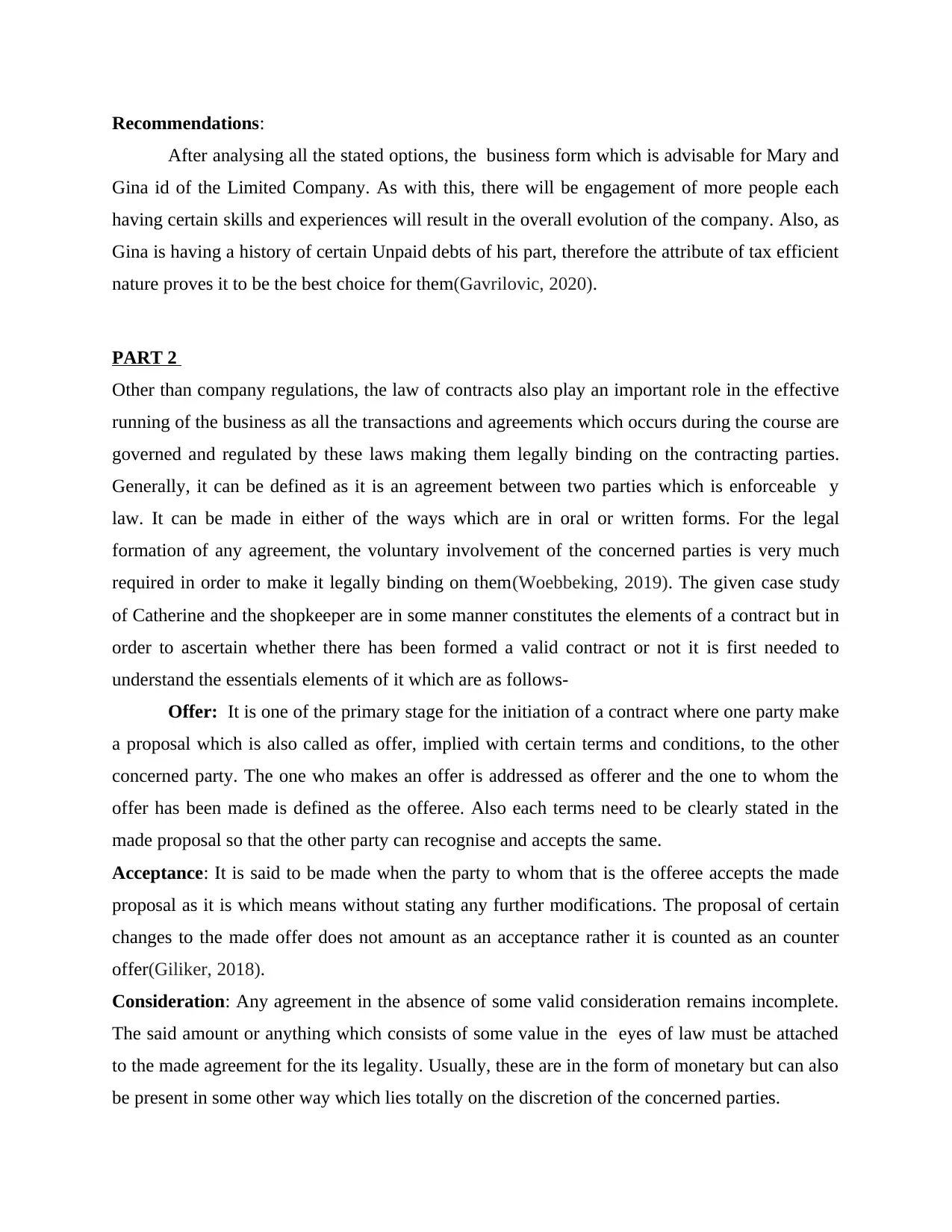
Recommendations:
After analysing all the stated options, the business form which is advisable for Mary and
Gina id of the Limited Company. As with this, there will be engagement of more people each
having certain skills and experiences will result in the overall evolution of the company. Also, as
Gina is having a history of certain Unpaid debts of his part, therefore the attribute of tax efficient
nature proves it to be the best choice for them(Gavrilovic, 2020).
PART 2
Other than company regulations, the law of contracts also play an important role in the effective
running of the business as all the transactions and agreements which occurs during the course are
governed and regulated by these laws making them legally binding on the contracting parties.
Generally, it can be defined as it is an agreement between two parties which is enforceable y
law. It can be made in either of the ways which are in oral or written forms. For the legal
formation of any agreement, the voluntary involvement of the concerned parties is very much
required in order to make it legally binding on them(Woebbeking, 2019). The given case study
of Catherine and the shopkeeper are in some manner constitutes the elements of a contract but in
order to ascertain whether there has been formed a valid contract or not it is first needed to
understand the essentials elements of it which are as follows-
Offer: It is one of the primary stage for the initiation of a contract where one party make
a proposal which is also called as offer, implied with certain terms and conditions, to the other
concerned party. The one who makes an offer is addressed as offerer and the one to whom the
offer has been made is defined as the offeree. Also each terms need to be clearly stated in the
made proposal so that the other party can recognise and accepts the same.
Acceptance: It is said to be made when the party to whom that is the offeree accepts the made
proposal as it is which means without stating any further modifications. The proposal of certain
changes to the made offer does not amount as an acceptance rather it is counted as an counter
offer(Giliker, 2018).
Consideration: Any agreement in the absence of some valid consideration remains incomplete.
The said amount or anything which consists of some value in the eyes of law must be attached
to the made agreement for the its legality. Usually, these are in the form of monetary but can also
be present in some other way which lies totally on the discretion of the concerned parties.
After analysing all the stated options, the business form which is advisable for Mary and
Gina id of the Limited Company. As with this, there will be engagement of more people each
having certain skills and experiences will result in the overall evolution of the company. Also, as
Gina is having a history of certain Unpaid debts of his part, therefore the attribute of tax efficient
nature proves it to be the best choice for them(Gavrilovic, 2020).
PART 2
Other than company regulations, the law of contracts also play an important role in the effective
running of the business as all the transactions and agreements which occurs during the course are
governed and regulated by these laws making them legally binding on the contracting parties.
Generally, it can be defined as it is an agreement between two parties which is enforceable y
law. It can be made in either of the ways which are in oral or written forms. For the legal
formation of any agreement, the voluntary involvement of the concerned parties is very much
required in order to make it legally binding on them(Woebbeking, 2019). The given case study
of Catherine and the shopkeeper are in some manner constitutes the elements of a contract but in
order to ascertain whether there has been formed a valid contract or not it is first needed to
understand the essentials elements of it which are as follows-
Offer: It is one of the primary stage for the initiation of a contract where one party make
a proposal which is also called as offer, implied with certain terms and conditions, to the other
concerned party. The one who makes an offer is addressed as offerer and the one to whom the
offer has been made is defined as the offeree. Also each terms need to be clearly stated in the
made proposal so that the other party can recognise and accepts the same.
Acceptance: It is said to be made when the party to whom that is the offeree accepts the made
proposal as it is which means without stating any further modifications. The proposal of certain
changes to the made offer does not amount as an acceptance rather it is counted as an counter
offer(Giliker, 2018).
Consideration: Any agreement in the absence of some valid consideration remains incomplete.
The said amount or anything which consists of some value in the eyes of law must be attached
to the made agreement for the its legality. Usually, these are in the form of monetary but can also
be present in some other way which lies totally on the discretion of the concerned parties.
Paraphrase This Document
Need a fresh take? Get an instant paraphrase of this document with our AI Paraphraser
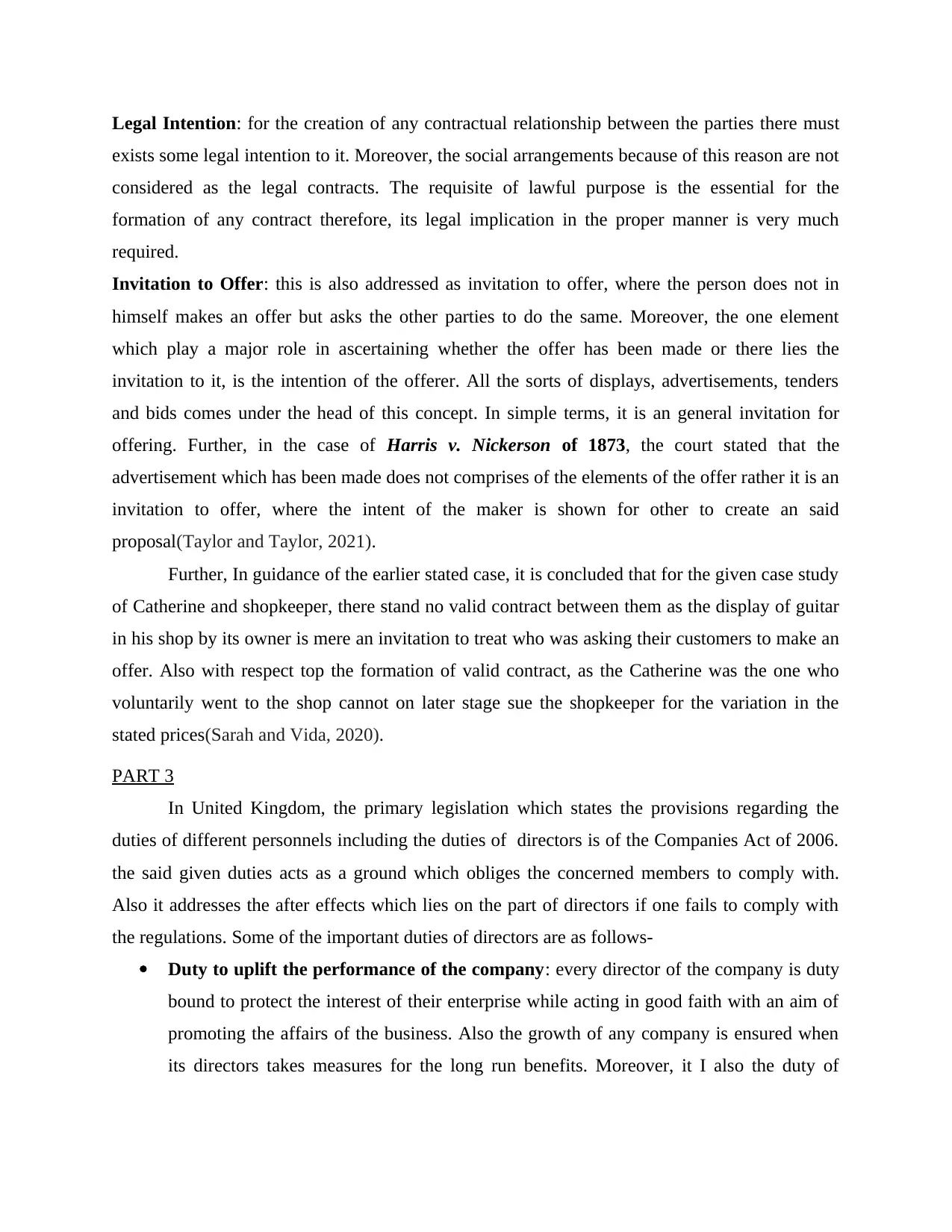
Legal Intention: for the creation of any contractual relationship between the parties there must
exists some legal intention to it. Moreover, the social arrangements because of this reason are not
considered as the legal contracts. The requisite of lawful purpose is the essential for the
formation of any contract therefore, its legal implication in the proper manner is very much
required.
Invitation to Offer: this is also addressed as invitation to offer, where the person does not in
himself makes an offer but asks the other parties to do the same. Moreover, the one element
which play a major role in ascertaining whether the offer has been made or there lies the
invitation to it, is the intention of the offerer. All the sorts of displays, advertisements, tenders
and bids comes under the head of this concept. In simple terms, it is an general invitation for
offering. Further, in the case of Harris v. Nickerson of 1873, the court stated that the
advertisement which has been made does not comprises of the elements of the offer rather it is an
invitation to offer, where the intent of the maker is shown for other to create an said
proposal(Taylor and Taylor, 2021).
Further, In guidance of the earlier stated case, it is concluded that for the given case study
of Catherine and shopkeeper, there stand no valid contract between them as the display of guitar
in his shop by its owner is mere an invitation to treat who was asking their customers to make an
offer. Also with respect top the formation of valid contract, as the Catherine was the one who
voluntarily went to the shop cannot on later stage sue the shopkeeper for the variation in the
stated prices(Sarah and Vida, 2020).
PART 3
In United Kingdom, the primary legislation which states the provisions regarding the
duties of different personnels including the duties of directors is of the Companies Act of 2006.
the said given duties acts as a ground which obliges the concerned members to comply with.
Also it addresses the after effects which lies on the part of directors if one fails to comply with
the regulations. Some of the important duties of directors are as follows-
Duty to uplift the performance of the company: every director of the company is duty
bound to protect the interest of their enterprise while acting in good faith with an aim of
promoting the affairs of the business. Also the growth of any company is ensured when
its directors takes measures for the long run benefits. Moreover, it I also the duty of
exists some legal intention to it. Moreover, the social arrangements because of this reason are not
considered as the legal contracts. The requisite of lawful purpose is the essential for the
formation of any contract therefore, its legal implication in the proper manner is very much
required.
Invitation to Offer: this is also addressed as invitation to offer, where the person does not in
himself makes an offer but asks the other parties to do the same. Moreover, the one element
which play a major role in ascertaining whether the offer has been made or there lies the
invitation to it, is the intention of the offerer. All the sorts of displays, advertisements, tenders
and bids comes under the head of this concept. In simple terms, it is an general invitation for
offering. Further, in the case of Harris v. Nickerson of 1873, the court stated that the
advertisement which has been made does not comprises of the elements of the offer rather it is an
invitation to offer, where the intent of the maker is shown for other to create an said
proposal(Taylor and Taylor, 2021).
Further, In guidance of the earlier stated case, it is concluded that for the given case study
of Catherine and shopkeeper, there stand no valid contract between them as the display of guitar
in his shop by its owner is mere an invitation to treat who was asking their customers to make an
offer. Also with respect top the formation of valid contract, as the Catherine was the one who
voluntarily went to the shop cannot on later stage sue the shopkeeper for the variation in the
stated prices(Sarah and Vida, 2020).
PART 3
In United Kingdom, the primary legislation which states the provisions regarding the
duties of different personnels including the duties of directors is of the Companies Act of 2006.
the said given duties acts as a ground which obliges the concerned members to comply with.
Also it addresses the after effects which lies on the part of directors if one fails to comply with
the regulations. Some of the important duties of directors are as follows-
Duty to uplift the performance of the company: every director of the company is duty
bound to protect the interest of their enterprise while acting in good faith with an aim of
promoting the affairs of the business. Also the growth of any company is ensured when
its directors takes measures for the long run benefits. Moreover, it I also the duty of
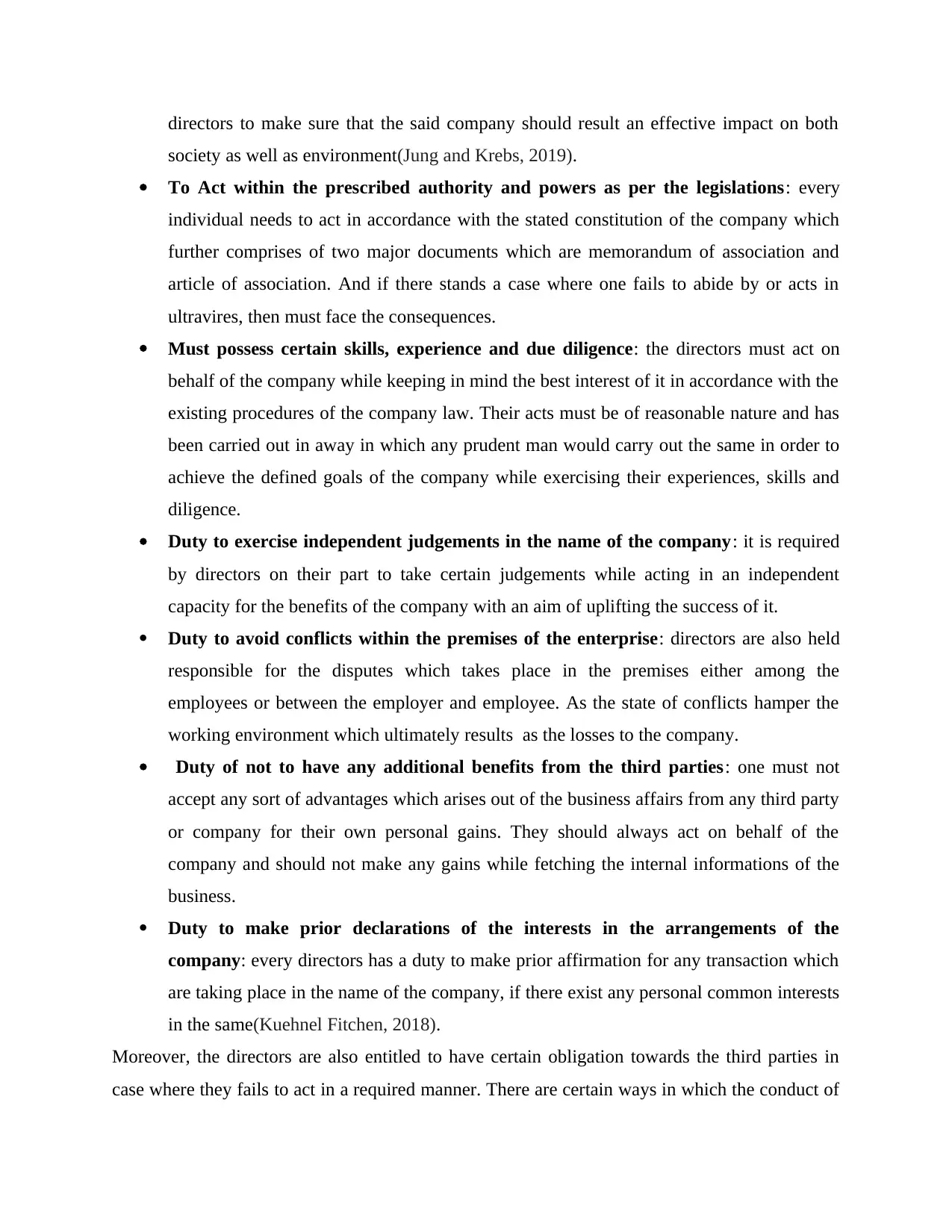
directors to make sure that the said company should result an effective impact on both
society as well as environment(Jung and Krebs, 2019).
To Act within the prescribed authority and powers as per the legislations: every
individual needs to act in accordance with the stated constitution of the company which
further comprises of two major documents which are memorandum of association and
article of association. And if there stands a case where one fails to abide by or acts in
ultravires, then must face the consequences.
Must possess certain skills, experience and due diligence: the directors must act on
behalf of the company while keeping in mind the best interest of it in accordance with the
existing procedures of the company law. Their acts must be of reasonable nature and has
been carried out in away in which any prudent man would carry out the same in order to
achieve the defined goals of the company while exercising their experiences, skills and
diligence.
Duty to exercise independent judgements in the name of the company: it is required
by directors on their part to take certain judgements while acting in an independent
capacity for the benefits of the company with an aim of uplifting the success of it.
Duty to avoid conflicts within the premises of the enterprise: directors are also held
responsible for the disputes which takes place in the premises either among the
employees or between the employer and employee. As the state of conflicts hamper the
working environment which ultimately results as the losses to the company.
Duty of not to have any additional benefits from the third parties: one must not
accept any sort of advantages which arises out of the business affairs from any third party
or company for their own personal gains. They should always act on behalf of the
company and should not make any gains while fetching the internal informations of the
business.
Duty to make prior declarations of the interests in the arrangements of the
company: every directors has a duty to make prior affirmation for any transaction which
are taking place in the name of the company, if there exist any personal common interests
in the same(Kuehnel Fitchen, 2018).
Moreover, the directors are also entitled to have certain obligation towards the third parties in
case where they fails to act in a required manner. There are certain ways in which the conduct of
society as well as environment(Jung and Krebs, 2019).
To Act within the prescribed authority and powers as per the legislations: every
individual needs to act in accordance with the stated constitution of the company which
further comprises of two major documents which are memorandum of association and
article of association. And if there stands a case where one fails to abide by or acts in
ultravires, then must face the consequences.
Must possess certain skills, experience and due diligence: the directors must act on
behalf of the company while keeping in mind the best interest of it in accordance with the
existing procedures of the company law. Their acts must be of reasonable nature and has
been carried out in away in which any prudent man would carry out the same in order to
achieve the defined goals of the company while exercising their experiences, skills and
diligence.
Duty to exercise independent judgements in the name of the company: it is required
by directors on their part to take certain judgements while acting in an independent
capacity for the benefits of the company with an aim of uplifting the success of it.
Duty to avoid conflicts within the premises of the enterprise: directors are also held
responsible for the disputes which takes place in the premises either among the
employees or between the employer and employee. As the state of conflicts hamper the
working environment which ultimately results as the losses to the company.
Duty of not to have any additional benefits from the third parties: one must not
accept any sort of advantages which arises out of the business affairs from any third party
or company for their own personal gains. They should always act on behalf of the
company and should not make any gains while fetching the internal informations of the
business.
Duty to make prior declarations of the interests in the arrangements of the
company: every directors has a duty to make prior affirmation for any transaction which
are taking place in the name of the company, if there exist any personal common interests
in the same(Kuehnel Fitchen, 2018).
Moreover, the directors are also entitled to have certain obligation towards the third parties in
case where they fails to act in a required manner. There are certain ways in which the conduct of
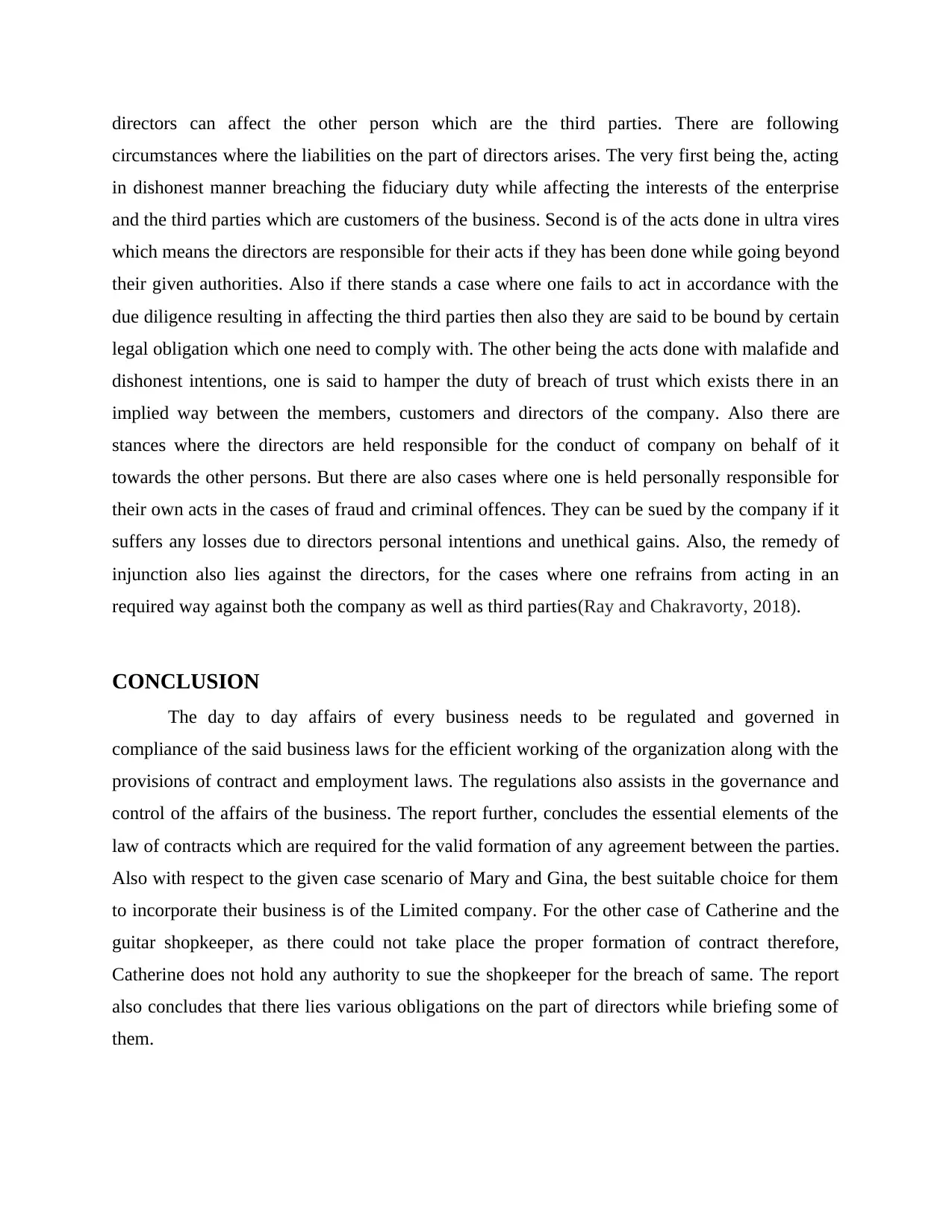
directors can affect the other person which are the third parties. There are following
circumstances where the liabilities on the part of directors arises. The very first being the, acting
in dishonest manner breaching the fiduciary duty while affecting the interests of the enterprise
and the third parties which are customers of the business. Second is of the acts done in ultra vires
which means the directors are responsible for their acts if they has been done while going beyond
their given authorities. Also if there stands a case where one fails to act in accordance with the
due diligence resulting in affecting the third parties then also they are said to be bound by certain
legal obligation which one need to comply with. The other being the acts done with malafide and
dishonest intentions, one is said to hamper the duty of breach of trust which exists there in an
implied way between the members, customers and directors of the company. Also there are
stances where the directors are held responsible for the conduct of company on behalf of it
towards the other persons. But there are also cases where one is held personally responsible for
their own acts in the cases of fraud and criminal offences. They can be sued by the company if it
suffers any losses due to directors personal intentions and unethical gains. Also, the remedy of
injunction also lies against the directors, for the cases where one refrains from acting in an
required way against both the company as well as third parties(Ray and Chakravorty, 2018).
CONCLUSION
The day to day affairs of every business needs to be regulated and governed in
compliance of the said business laws for the efficient working of the organization along with the
provisions of contract and employment laws. The regulations also assists in the governance and
control of the affairs of the business. The report further, concludes the essential elements of the
law of contracts which are required for the valid formation of any agreement between the parties.
Also with respect to the given case scenario of Mary and Gina, the best suitable choice for them
to incorporate their business is of the Limited company. For the other case of Catherine and the
guitar shopkeeper, as there could not take place the proper formation of contract therefore,
Catherine does not hold any authority to sue the shopkeeper for the breach of same. The report
also concludes that there lies various obligations on the part of directors while briefing some of
them.
circumstances where the liabilities on the part of directors arises. The very first being the, acting
in dishonest manner breaching the fiduciary duty while affecting the interests of the enterprise
and the third parties which are customers of the business. Second is of the acts done in ultra vires
which means the directors are responsible for their acts if they has been done while going beyond
their given authorities. Also if there stands a case where one fails to act in accordance with the
due diligence resulting in affecting the third parties then also they are said to be bound by certain
legal obligation which one need to comply with. The other being the acts done with malafide and
dishonest intentions, one is said to hamper the duty of breach of trust which exists there in an
implied way between the members, customers and directors of the company. Also there are
stances where the directors are held responsible for the conduct of company on behalf of it
towards the other persons. But there are also cases where one is held personally responsible for
their own acts in the cases of fraud and criminal offences. They can be sued by the company if it
suffers any losses due to directors personal intentions and unethical gains. Also, the remedy of
injunction also lies against the directors, for the cases where one refrains from acting in an
required way against both the company as well as third parties(Ray and Chakravorty, 2018).
CONCLUSION
The day to day affairs of every business needs to be regulated and governed in
compliance of the said business laws for the efficient working of the organization along with the
provisions of contract and employment laws. The regulations also assists in the governance and
control of the affairs of the business. The report further, concludes the essential elements of the
law of contracts which are required for the valid formation of any agreement between the parties.
Also with respect to the given case scenario of Mary and Gina, the best suitable choice for them
to incorporate their business is of the Limited company. For the other case of Catherine and the
guitar shopkeeper, as there could not take place the proper formation of contract therefore,
Catherine does not hold any authority to sue the shopkeeper for the breach of same. The report
also concludes that there lies various obligations on the part of directors while briefing some of
them.
Secure Best Marks with AI Grader
Need help grading? Try our AI Grader for instant feedback on your assignments.

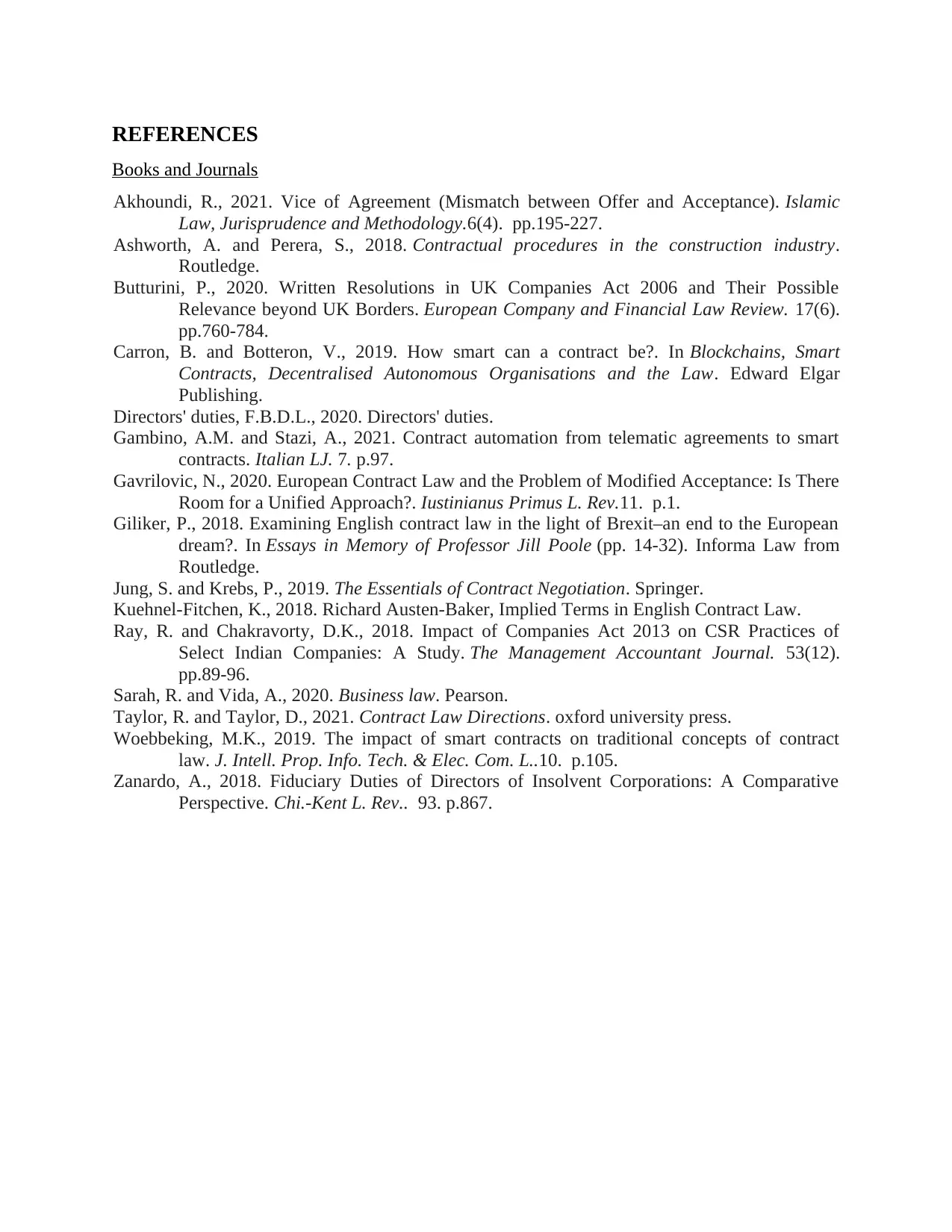
REFERENCES
Books and Journals
Akhoundi, R., 2021. Vice of Agreement (Mismatch between Offer and Acceptance). Islamic
Law, Jurisprudence and Methodology.6(4). pp.195-227.
Ashworth, A. and Perera, S., 2018. Contractual procedures in the construction industry.
Routledge.
Butturini, P., 2020. Written Resolutions in UK Companies Act 2006 and Their Possible
Relevance beyond UK Borders. European Company and Financial Law Review. 17(6).
pp.760-784.
Carron, B. and Botteron, V., 2019. How smart can a contract be?. In Blockchains, Smart
Contracts, Decentralised Autonomous Organisations and the Law. Edward Elgar
Publishing.
Directors' duties, F.B.D.L., 2020. Directors' duties.
Gambino, A.M. and Stazi, A., 2021. Contract automation from telematic agreements to smart
contracts. Italian LJ. 7. p.97.
Gavrilovic, N., 2020. European Contract Law and the Problem of Modified Acceptance: Is There
Room for a Unified Approach?. Iustinianus Primus L. Rev.11. p.1.
Giliker, P., 2018. Examining English contract law in the light of Brexit–an end to the European
dream?. In Essays in Memory of Professor Jill Poole (pp. 14-32). Informa Law from
Routledge.
Jung, S. and Krebs, P., 2019. The Essentials of Contract Negotiation. Springer.
Kuehnel-Fitchen, K., 2018. Richard Austen-Baker, Implied Terms in English Contract Law.
Ray, R. and Chakravorty, D.K., 2018. Impact of Companies Act 2013 on CSR Practices of
Select Indian Companies: A Study. The Management Accountant Journal. 53(12).
pp.89-96.
Sarah, R. and Vida, A., 2020. Business law. Pearson.
Taylor, R. and Taylor, D., 2021. Contract Law Directions. oxford university press.
Woebbeking, M.K., 2019. The impact of smart contracts on traditional concepts of contract
law. J. Intell. Prop. Info. Tech. & Elec. Com. L..10. p.105.
Zanardo, A., 2018. Fiduciary Duties of Directors of Insolvent Corporations: A Comparative
Perspective. Chi.-Kent L. Rev.. 93. p.867.
Books and Journals
Akhoundi, R., 2021. Vice of Agreement (Mismatch between Offer and Acceptance). Islamic
Law, Jurisprudence and Methodology.6(4). pp.195-227.
Ashworth, A. and Perera, S., 2018. Contractual procedures in the construction industry.
Routledge.
Butturini, P., 2020. Written Resolutions in UK Companies Act 2006 and Their Possible
Relevance beyond UK Borders. European Company and Financial Law Review. 17(6).
pp.760-784.
Carron, B. and Botteron, V., 2019. How smart can a contract be?. In Blockchains, Smart
Contracts, Decentralised Autonomous Organisations and the Law. Edward Elgar
Publishing.
Directors' duties, F.B.D.L., 2020. Directors' duties.
Gambino, A.M. and Stazi, A., 2021. Contract automation from telematic agreements to smart
contracts. Italian LJ. 7. p.97.
Gavrilovic, N., 2020. European Contract Law and the Problem of Modified Acceptance: Is There
Room for a Unified Approach?. Iustinianus Primus L. Rev.11. p.1.
Giliker, P., 2018. Examining English contract law in the light of Brexit–an end to the European
dream?. In Essays in Memory of Professor Jill Poole (pp. 14-32). Informa Law from
Routledge.
Jung, S. and Krebs, P., 2019. The Essentials of Contract Negotiation. Springer.
Kuehnel-Fitchen, K., 2018. Richard Austen-Baker, Implied Terms in English Contract Law.
Ray, R. and Chakravorty, D.K., 2018. Impact of Companies Act 2013 on CSR Practices of
Select Indian Companies: A Study. The Management Accountant Journal. 53(12).
pp.89-96.
Sarah, R. and Vida, A., 2020. Business law. Pearson.
Taylor, R. and Taylor, D., 2021. Contract Law Directions. oxford university press.
Woebbeking, M.K., 2019. The impact of smart contracts on traditional concepts of contract
law. J. Intell. Prop. Info. Tech. & Elec. Com. L..10. p.105.
Zanardo, A., 2018. Fiduciary Duties of Directors of Insolvent Corporations: A Comparative
Perspective. Chi.-Kent L. Rev.. 93. p.867.
1 out of 12
Related Documents
Your All-in-One AI-Powered Toolkit for Academic Success.
+13062052269
info@desklib.com
Available 24*7 on WhatsApp / Email
![[object Object]](/_next/static/media/star-bottom.7253800d.svg)
Unlock your academic potential
© 2024 | Zucol Services PVT LTD | All rights reserved.

